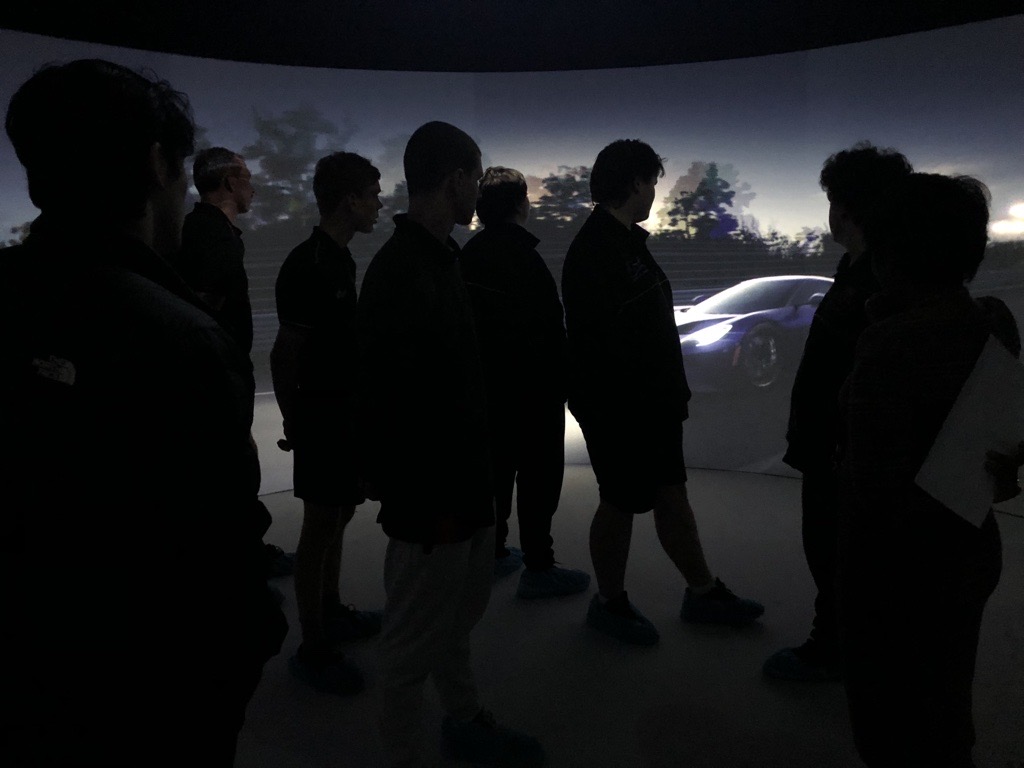Indigenous teens explore uni life at Swinburne

Clontarf students explore the history of Ford and visit Egypt and Venice in the immersive 360 degree viewing room, Igloo
In summary
- The Moondani Toombadool Centre has hosted the 2022 Clontarf Leadership Camp at Swinburne’s Hawthorn campus and KIOSC
- A group of Indigenous teens got a first-hand look at Swinburne courses, took part in science and technology demonstrations and enjoyed a chance to hear from current students
- The Clontarf Foundation partnership focuses on improving the education, discipline, life skills, self-esteem and employment prospects of young Aboriginal and Torres Strait Islander men
Indigenous teen boys from across Victoria have experienced a taste of what on-campus university life is like at Swinburne University of Technology.
Swinburne’s Moondani Toombadool Centre hosted the Clontarf Foundation students, giving the teens a first-hand look at Swinburne courses and a chance to hear from current students.

Clontarf students experience the VR goggles at KIOSC thanks to the partnership with Swinburne
Virtual reality goggles show their potential futures
The Clontarf Leadership Camp is a three-day program. The students participate in science, technology and health demonstrations.
While at Knox Innovation Opportunity and Sustainability Centre (KIOSC), the students stepped into the immersive 360 degree viewing room called ‘Igloo’, where they discovered the history of Ford and visited Egypt and Venice. A drone flying challenge came next, then a few games on the virtual reality (VR) goggles. They ended the session with a demonstration of chemical reactions related to the Mission on Mars Challenge, which looks at how humans can live and work on Mars.
Dr Kulari Lokuge is the Director at KIOSC, which is a partnership between the Knox Consortium of Secondary Schools and Swinburne.
“The students were very excited and keen to know more. They loved the engagement and hands-on activities, and they enjoyed learning about future opportunities,” says Dr Lokuge.
“The experience takes them through future careers. We explain what type of university studies are required for these careers and what pathways are available through Swinburne. We always find that some students are still not sure what options and opportunities are available.”
The Clontarf students also met with the Korin Gamadji Institute, Richmond Football Club's centre for Aboriginal and Torres Strait Islander youth leadership.

Swinburne brought its partnership with Richmond Football Club to the party, with the teen boys hearing from players. They are pictured, here, on Swinburne’s basketball half court.
Meeting with future employers
The camp follows the Clontarf Employment Forum, which is a development event that allows students to network with representatives from industry and diverse occupations. They also learn about pathways opportunities.

Students heard from potential future employers at this year’s Clontarf Employment Forum, hosted by Swinburne
A partnership to create pathways
Swinburne partnered with Clontarf Foundation in 2020. Clontarf is a non-profit community organisation that focuses on improving the education, discipline, life skills, self-esteem and employment prospects of young Aboriginal and Torres Strait Islander men.
Manager Indigenous Student Services for the Moondani Toombadool Centre, Vicky Peters, has worked closely with Clontarf to foster the partnership.
“The Clontarf Partnership gives us the opportunity to build meaningful relationships with hundreds of Indigenous young men over time, particularly in Victoria,” says Peters.
“These ongoing relationships break down many barriers for those boys thinking about or with aspirations for further education.”
Vicky is one of the many supportive staff at the Moondani Toombadool Centre, which is responsible for all Aboriginal and Torres Strait Islander matters at Swinburne.
“For those students who choose to come to Swinburne, our Moondani Toombadool Centre has a dedicated team providing personalised services to Indigenous students – including pre-enrolment advice, enrolment support, orientation, academic support, scholarships, advocacy, referral service and graduation celebrations. We celebrate and showcase our culture and provide culturally safe spaces across our campuses,” says Peters.
-
Media Enquiries
Related articles
-

- University
The future of fashion: Swinburne launches groundbreaking tech-focused fashion course
Swinburne University of Technology is fusing high tech and high fashion to launch a new forward-thinking Bachelor of Design (Fashion).
Thursday 25 July 2024 -

- University
Swinburne achieves first Cygnet Award through SAGE Athena Swan program
Swinburne has achieved its first Science in Australia Gender Equity (SAGE) Athena Swan Cygnet Award.
Monday 01 July 2024 -

- University
Future of National Institute of Circus Arts (NICA) secured
NICA will transition from Swinburne to the Australian College of the Arts (Collarts), as part of a new agreement that secures the future of circus arts in Australia.
Monday 22 July 2024 -

- University
Swinburne among world’s top 15 universities for scientific impact
Swinburne has been ranked in the top 15 universities in the world for scientific impact across all disciplines, based on the proportion of a university’s papers that belong to the top 1 per cent most cited in the 2024 CWTS Leiden Rankings.
Friday 19 July 2024 -

- University
Opinion: The missed opportunity in the Australian Universities Accord
The Federal Government’s announcement of the Australian Universities Accord Implementation Advisory Committee is welcome, but the glaring omission of dual sector representation is a missed opportunity.
Monday 17 June 2024

